|
On weekends there, we could hob nob with the local Syrians and Cajuns. This included the Mayor, the Chief of Police and many other well known citizens. I have many pictures of these happy weekends in the "Cajun Country" of Lafayette, LA. Have many happy memories of the Cajun Cuisine and hospitality. None of us made any serious attachments there. Charlie was the most serious but after shipping out, they broke it off.
I will write later of my contacts with Dan Fietel after the ending of the war.
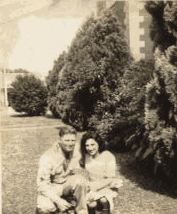
While stationed in LA, the 8th Armored Division played the part of the "enemy force" in a series of maneuvers. This series of exercises were labeled alphabetically; A, B, C, D, E.
These maneuvers would each last two or three weeks and new Army Divisions opposed the 8th Armored in each series. Some of these exercises were very exhausting and grueling and very similar to actual combat conditions. In fact, while in combat in Germany when some replacements complained about the present conditions in Germany, we answered with "you ain't seen nothing yet, you should have been in the "E" Series in Louisiana".
While not on maneuvers we were on garrison duty at South Camp Polk. There was one exception. For a two week period, we were assigned a submarine watch on a stretch of beach on the Gulf.
Supposedly the Germans had been landing spies and saboteurs on these lonely unpatroled beaches. We patrolled the beaches at night with loaded rifles. During the day we frolicked on the beaches. It was good duty but the large numbers of jellyfishes made swimming a danger. We saw no spies.
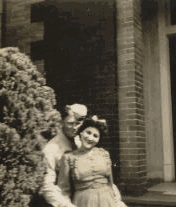
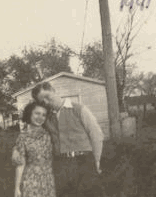
Dan Fietel entered our lives again one weekend on a three day pass to New Orleans. Charlie Saab and his three friends arrived in New Orleans without any hotel reservations. We were bound and determined to stay at the Roosevelt Hotel, the finest hotel in New Orleans at that time.
We four army Sgts. boldly walked up to the Registration Desk and asked for two rooms. The clerk just looked at us in amazement as their clientele was of high ranking officers of the various services. Brass was everywhere in the elegant lobby. We were politely, but brusquely told that there were no rooms available. No room at the inn for 4 common Sgts.
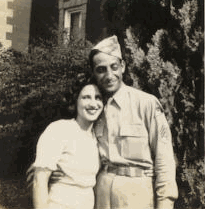
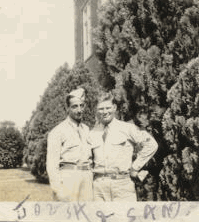
We slowly walked away from the counter. We had no place to go. Charlie then remarked that Dan Fietel maintained the top suite of rooms at the Roosevelt and told us that if we ever were in New Orleans to mention his name at the Roosevelt. We returned to the Registration Desk as we agreed that we had nothing to lose. We got the same clerk who had treated us so rudely a few minutes ago "and what can I do for you now" he asked. I replied that Dan Fietel had told us to give his name if we ever were in New Orleans. An immediate transformation took place in the clerk. His face changed, his tone of voice became very gracious to us. We got 2 rooms in the Penthouse of the Roosevelt. Our rooms overlooked Canal Street. We used Room Service and had our clothes pressed and even had drinks delivered to our room. We were the "big spenders" for the weekend, and planned to pay our bills. On checking out we were very pleasantly surprised when the checkout clerk told us that Dan Fietel had already taken care of the bill. Talk about Southern Hospitality. This was just one of the nice things that Dan Fietel did for us.
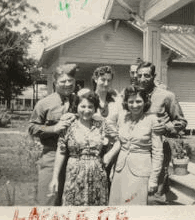
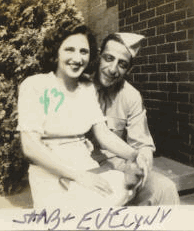
I spoke earlier of how Capt. Albrick inspired his men. I remember the time the Battalion was involved in a competition of building a Double Double Bailey Bridge which is a steel bridge composed of heavy steel bridge sections.
Each company had to participate and assemble it at night. Capt. Albrick called a meeting of his officers and non-coms to plan our strategy. The Capt., asked for any suggestions as to how we could save time in putting the bridge together. One of the Heavy Equipment Sgts., a Sgt. Crane suggested that we use a truck crane with special chains to more efficiently assemble the Double Bailey Bridge. It normally took 8 men to move the bridge sections into place. The Capt. agreed that the proposed method would move the heavy panels into place quicker and more efficiently. It worked on the next night, we set a new army record for assembling that type of bridge. In fact we beat the recommended field manual time by 2 hours. We were a proud group of Engineers that night when we got back to the barracks.
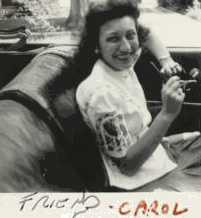
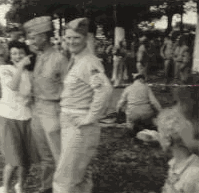
Being in the army requires that you perform your assigned duties. You still have time for and are encouraged to participate in certain Recreational Activities. While in the Engineers I participated on both the Battalion touch football team and the Battalion Basketball team. Considering that a Battalion consists of 800 men, I was one of the select few to be chosen on the team. I was in good physical shape.
The Battalion Catholic Chaplain was a big Polish Priest from Buffalo, New York. He played in our backfield on our Touch Football Teams. The term "Touch" was a misnomer. It was not touch, it was rough and tough. The game was "touch or tag" football. There was no tackling but any and all kinds of hitting and blocking was legal. There was not love lost between the Artillery, Infantry or Tankers and the Engineers.
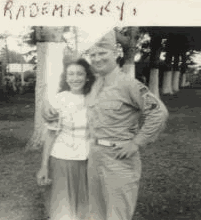
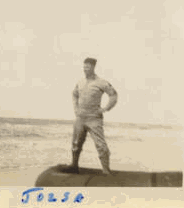
The games were played with the players wearing green fatigues. The Polish Chaplain prior to the start of the game took off the Chaplain Capt. Bars and Chaplain Pins. Capt. Albrick played and likewise took off his bars.
In the championship game against the Infantry the Chaplain was having an extremely good game, making great gains and frustrating the Infantry with his tricky and deceptive moves. Soon they began to refer him by yells such as "Get that Son of a Bitch". This continued through-out the whole game. We won and went to the locker rooms to shower up. There the Chaplain pinned on his Captain's bars and his Chaplains Cross. Needless to say the Infantry Men felt awfully embarrassed to find out that the person they had been calling a "Son of a Bitch" was really a Catholic Chaplain.
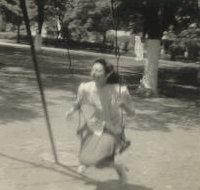
The motto that Captain Albrick had hung over his office door read "The Difficult we do immediately, the impossible takes a little longer".
This saying seemed to be true after we left Fort Knox for Camp Campbell.
We had moved out of our barracks and had pitched our shelter half tents within sight of the place at Fort Knox where the U.S. Gov't. stores it's gold. After that one night at Fort Knox the Company of Engineers moved into newly completed barracks in Camp Campbell, Kentucky. The army had moved us there with one specific job in mind. The camp was new. Troops had not yet moved in. Sidewalks were missing. Our job was to install temporary wooden boardwalks for immediate use until the weather permitted the pouring of concrete sidewalks. Our "sidewalks" were boardwalks.

We organized our work crews. One crew assembled them while other crews installed them through the many miles of walkways in Camp Campbell. I even utilized some of the knowledge acquired at the Norge Corporation in the Heights to construct giant "jigs" to move quickly assemble the boardwalks in 15 foot sections. We set up a very efficient production line.
After the assembly crew completed its job the Delivery Crew did its job. In a matter of less than two weeks we had completed a complete network of usable boardwalks or temporary sidewalks for the entire Camp Campbell area. The saying was true. "The Difficult we do immediately, the impossible takes a little longer".
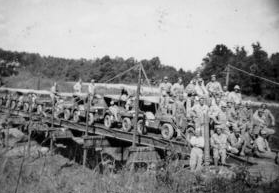
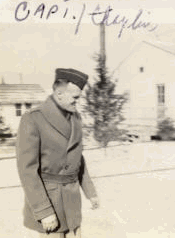
After the 8th Armored Division, or the Thundering Herd as we were known, completed its training missions as the enemy we were then declared ready for combat. We prepared our equipment for overseas shipment and were now prepared and ready for combat.
"D" Day had taken place and we were about to be actively involved in the battle for the total defeat of Germany. Our equipment was loaded on railroad cars. Our weapons were checked and cosmolined and every one received their required shots from typhus to tetanus. We were placed on "overseas alert" just waiting for our final orders to leave.
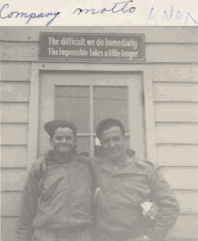
Instead of a move order I got word from the American Red Cross that my father was seriously ill in the hospital at Muskegon and that the Red Cross had arranged an emergency furlough for me to visit my dad at home.
This presented a real problem for me. I loved my Dad. If the orders to move to the P.O.E. (Port of Embarkation) came and I was not with the Company then I would not be able to remain with my Company. I would just be randomly assigned to the nearest Replacement Depot for reassignment to a current Combat Unit. I would be assigned to another unit as a Casual Replacement. As a "casual", you are usually placed where needed ; usually as a battlefield replacement, to fight alongside complete strangers.
I flew home from Shreveport, LA. On arriving home I went directly to the hospital to see my father. He was very sick. He had a bad case of pneumonia I guess. He noticed my new clothes, boots, short haircut and asked "You're ready to go overseas? Aren't you?" I was under strict orders not to say anything to anybody about our leaving. So I answered that I couldn't say anything about that. He understood and a few days later he had improved and I was ready to return to Camp Polk. I got back in time and a week later we were on our way to the P.O.E. by rail (Port of Embarkation) by way of Fort Dix. After the war I found out that I had missed the taking of the official pictures of our unit.
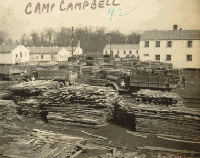
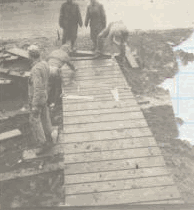
It took almost two days to get there. While at Fort Dix we completed the final preparations for shipment overseas. We were given a 12 hour pass to go to New York City, "The Big Apple". Six of us chipped in and hired a Checker Cab to take us to New York City and to return us to Fort Dix at midnight. We were dropped off at Times Square. Had a good civilian meal at a nice restaurant. Had a few drinks at a Times Square Bar. Visited a Dance Hall, didn't dance. Wasn't in the mood. Then back to our cab in Times Square and then back to Fort Dix. We could truthfully say that we spent most of our last hours in the United States in the Big Apple.
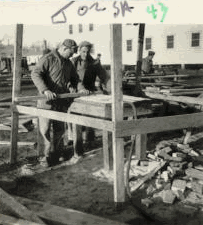
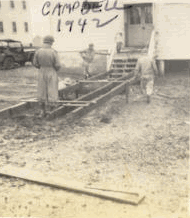
A few days later we boarded H.M.S. (Her Majesty's Ship) Samaria. Our company was one of the first to board as we had been assigned to bunk on the Promenade Deck as we had been designated as the Blackout and Security Detail. We had M.P. armbands but did not carry any weapons only a club. Our job was to patrol the ship looking for any blackout violations. Our accommodations on the Promenade Deck were much better than most of the others below decks.
We noticed this as we patrolled the entire ships area in our quest for blackout violators.
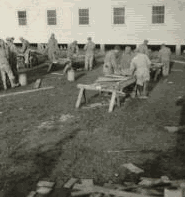
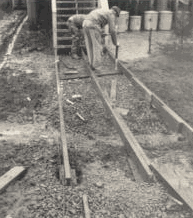
The H.M.S. Samaria was an English Passenger Ship which had been on the England to India run for many years. The ship being English, also had a complete English crew which included the English cooks. I use that term loosely, as the American GIs on board questioned their cooking abilities. The meals were not very good. It was, of course, prepared English style and not very appetizing. The menu consisted of a lot of fat, greasy mutton. The food plus the November crossing of the North Atlantic made for some very sick American soldiers. We were very lucky to have been assigned to the Promenade Deck. I don't think that any of our company got really seasick.
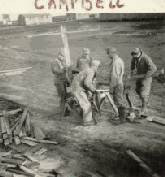
The "limey cooks", to add insult to injury, were selling just plain bacon sandwiches at night for $2.00. They were good.
The American soldiers had no love for the ship or the crew. Amongst the American soldiers the ship was referred to as "Her Majesty's Scow" the Samaria. This disgust for the Samaria was still obvious when a month later in England at a Company Formation our Captain announced that it had been reported that the Samaria had been sunk by a German submarine while returning to the United States. The entire company cheered its sinking. How morbid.
We had no serious incidents on the way over. We were part of a huge convoy which was protected by a large number of destroyers. A few times during the trip the convoy changed direction and followed a zig zag evasion pattern. Apparently the destroyers had detected the presence of some German submarines. We did hear some exploding depth charges but never got any reports on the results.
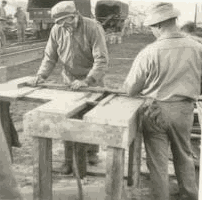
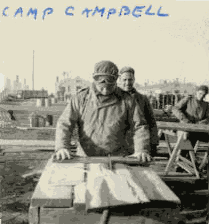
Mickey Rooney supposedly was on a troop transport directly behind us. The entire trip took 14 days and we finally landed at Southampton. Then we were trucked to the Tidworth Barracks at Andover, England near Salisbury. Our stay in England was to be very short. We did get to celebrate Thanksgiving there. I distinctly remember Private Francis Aiken, one of my opportunistic young men who was on K.P. that day at the huge main mess hall. We had our pre Thanksgiving meal ahead of time as Francis Aiken, our enterprising Irishman walked out of the Mess Hall with a fully cooked turkey under his field jacket. That was a Pre Thanksgiving "snack".
We also celebrated Christmas in England. I still remember the Midnite Mass I attended. Most of the soldiers there were in the process of being shipped to France to participate in the Battle of the Bulge. Little did we realize at the time that in a few short weeks we would also be in the Battle of the Bulge.
While in England I did get a three day pass which I spend in London. I saw the usual tourist attractions. Visited Baker Street, were Sherlock Holmes and Dr. Watson did their thing. Spent about four hours in Madame Tussauds Wax Museum, a real scary place to visit. Visited St. Paul's Cathedral and where the German bombs had done some damage to the Cathedral. Also walked around Picadilly Square which every American GI had to visit to see the blatant display of sex and prostitution. The ladies of the evening, paraded at all times of the day and openly advertised their wares, while newsboys sold newspapers and condoms at the same time.
Also saw the Tower of London, heard Big Ben ringing and spent three hours at Westminster Abbey.

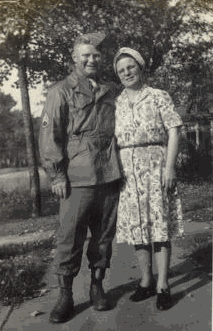
While in London I met up with a nice English lass who ended up as my guide in London and Westminster Abbey. She wore the uniform of the Auxiliary Territorial Service, the equivalent to our W.A.C.s. The Americans referred to them as America's Temporary Sweethearts. I guess it was very appropriate. My guide was very proper and very English.
I also had my experiences with the English Fog. I was lost one night and was trying to find my way back to my hotel. I swear that I asked the same policemen or "Bobby" twice for directions back to my hotel. He said you can't miss it.
I enjoyed riding on the English train system. It was much better than anything we had in the U.S.A.
I was very much intrigued by the Pub System, the neighborhood bar. They were heavily frequented by the American soldiers. The hardest thing to get used to was the serving of warm beer, as Americans like their beer cold. The pubs were very friendly places to frequent. I was introduced to Gin and Tonic, Stout, Bitters and various brands of English Ale. A change from American beer.
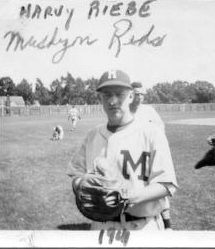
While in London, I also visited Covet Gardens, a huge entertainment center or ball room and while there I ran into two fellows from Muskegon. One was Harvey Reibi, a baseball player for our Professional Baseball Team in Muskegon in early 1940. The other fellow was named Arntz who had worked for P.J. Schlossman and his theaters. I had also worked for P.J. Schlossman when I ushered at the Strand Theater in the Heights.
My stay in London was short but very interesting, but then back to reality. One of the main jobs of the Engineers is to work with mines. Mine warfare by World War II had become very sophisticated. We had to have a very thorough knowledge of our friendly mine and also the enemy mines. World War II saw the most intensive use of mine warfare as mines can be both a defensive weapon as well as an offensive one. The Germans and the Japanese became experts in mine warfare. To be brought up to date on the latest in mines and mining techniques of the enemy the U.S. Army was offering schools informing the Army Engineers about the very latest in mines.
I was sent to one of these schools for a week of instruction. The school was at a place called Camp Foggelstone. Working to defuse a mine is very dangerous. A group of 8 American soldiers had been killed a week earlier at the Camp when a supposedly defused mine, an Italian Box mine exploded. The Germans made extensive use of mines and booby traps, especially as they retreated into Germany.
The Engineers always get the dirty job of clearing the mine fields or defusing the booby traps. The Germans were very tricky and creative as many G.I.'s found out. Metal detectors could not locate the plastic mines that the Germans used. The plastic mines had to be located by probing the ground with your bayonet.
I vividly remember two separate instances while at Fort Knox where mines caused Capt. Albrick and a Sgt. John Jozsa very serious trouble. Both of us ended up with hospital time. I had no injuries with mines in Europe but you do not receive Purple Heart Awards for stateside non combat injuries.
|